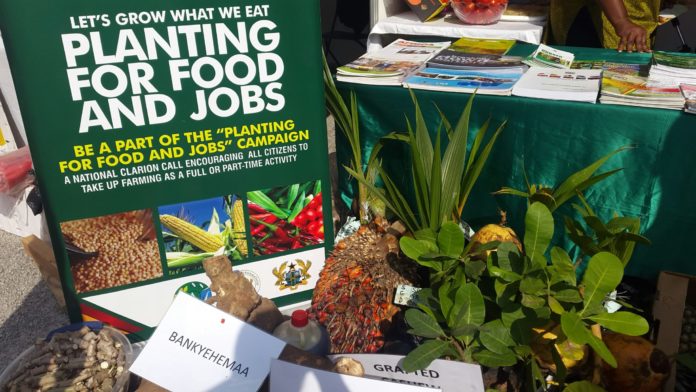Global Hand on Natural Environmental Care (GHANECare), a non-governmental organization has advocated that government must explore all possible means to determine viable and sufficient long-term funding for sustainability of ‘Planting for Food and Jobs’ (PFJ) programme.
This, according to the NGO, will ensure expansion of the programme to benefit more small-scale farmers across the country and build upon the programme’s achievements to guarantee food security and a robust agro raw material base for industrialization. Sustainable finance for the PFJ has been an issue of concern as the bulk of it [PFJ funding] is via donor funding.
Government, through the Ministry of Food and Agriculture (MoFA), in 2017 launched the PFJ to enhance agricultural productivity by motivating farmers to adopt certified seeds and fertilizers via private sector-led marketing frameworks. Government does so by raising the incentives and complementary service provisions on the usage of inputs, good agronomic practices, and marketing of outputs over an e-agriculture platform.
Interacting with journalists in Sunyani, Richard Kuunaah, Executive Director of GHANECare, urged government to incorporate PFJ into the Food and Agricultural Sector Development Policy (FASDEP). This, he noted, will further consolidate sustenance of the programme by making sure it is not tied to the current government alone but transcends political party regimes.
Somewhere in 2000, government formulated and implemented FASDEP phase-one (1) – which provided the framework for modernizing the agricultural sector as a catalyst for rural transformation. As a follow-up, FASDEPII was rolled-over with long-term policy objectives to further improve the sector.
He said the country would always be pushing the agricultural sector along parallel policies if proper harmonization is not done: “A study conducted by GHANECare revealed that many people, particularly farmers, are apprehensive about the sustainability of PFJ. Their uncertainty hinges on whether a different governments will be bonded to continue with the programme, as it is not incorporated into a national food and agricultural policy,” he added.
Mr. Kuunaah therefore called on MoFA – and for that matter, government – to conduct broader consultations to imbibe critical inputs in order to improve the programme and make it an acceptable national agricultural policy.








